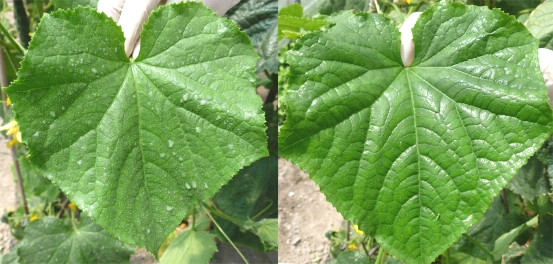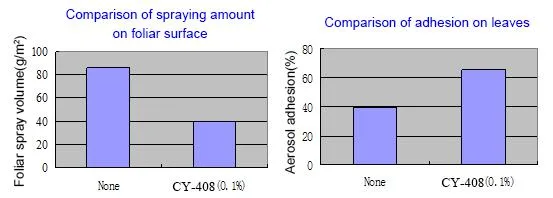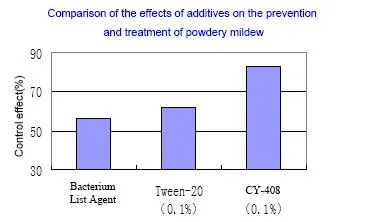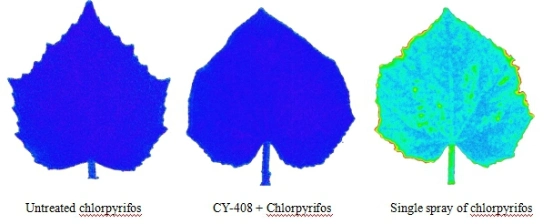Sylic® Agricultural Silicone Spreading Agent 408
Momentive Silwet 408
Basic Character
Agricultural Silicone Spreading Agent 408 is a polyether modified trisiloxane, which is a silicone
surfactant with good spreadability and permeability. In the process of spraying pesticides, it has
the characteristics of increasing efficiency, saving labor, saving water and saving medicine. It
can make sprayed agricultural chemicals play a better role, spread more easily, absorb faster
and not easily washed down, and have "rain-proof washout". When spraying pesticides, the
concentration of 0.1-0.05% can save more than 50% of pesticides. Reduced the amount of
pesticides lost to soil and groundwater, and reduced pesticide residues in the environment, in
line with the development direction of green agriculture.
Product Features
408 is a colorless to light amber liquid. Surface tension (0.1%): <20.5mN / m. Density:
1.01-1.03 g / cm3. Viscosity: (25 ° C) 40-60 mPa.s. Cloud point (0.1% wt%): <10 ºC.
408 can greatly reduce the surface tension of the pesticide spray solution, increase the coverage
of the spray, reduce the contact angle between the drug solution and the leaf surface, and enhance
the wetting, adhesion and adhesion of the drug solution on the surface of plants or diseases It
exhibits performance and allows pesticides to be absorbed through the stomata of the leaves,
which can improve the efficacy, reduce the dosage of pesticides, save costs, and reduce the
pollution of pesticides to the environment.
Use Area
Agricultural Silicone Spreading and Penetrating Agent can add to the biological pesticide spray
mixture liquid such as pesticide, bactericide, herbicide, foliar fertilizer, plant growth regulator,etc,
especially applied for systemic pharmacy.
Outstanding performance
408 has extremely strong spreading performance. First of all, we compared the spreading effect
of the liquid without synergist, added Tween-20 and 408 on the leaf surface. The results show
that the expansion diameter of the liquid added with 408 is up to 7 times that without the synergist.
The medicine liquid can be spread on the blade surface more evenly, directly improving the effective
utilization rate of the pesticide, and reducing the loss of the medicine liquid.

The permeability of different liquids on the surface of plant leaves
Subsequently, the pesticide chlorothalonil was evenly sprayed on the cucumber leaves. After
adding CY-408, the pesticide chlorothalonil sprayed on the cucumber leaf surface was reduced by
52.9%, and the drug droplets were crushed evenly, so that the leaves showed moisture. While reducing
the amount of use, the adhesion rate of pesticides on the surface of the leaves increased by 62.5%,
which improved the efficacy.

Add 408 (0.1%)
Comparison of spraying effect

Then, we will further study the auxiliary effect of CY-408 on pesticides by comparing the effects of
additives on powdery mildew. After adding CY-408, spraying 2000 times chlorothalonil can effectively
reduce the incidence of cucumber powdery mildew, and the control effect is 44.1% higher than
that without adding synergists.

Spraying pesticides may cause damage to the plants themselves while preventing pests and diseases.
After spraying 2,000 times of chlorpyrifos, we caused serious damage to the cucumber leaves, which
inhibited the photosynthesis of the plants. The uneven distribution of drug droplets caused local burns
on the leaves. After adding CY-408, the dosage of pesticide was reduced, the agent was spread evenly,
the photosynthesis was not damaged, and the plants grew normally.

Changes of chlorophyll fluorescence in cucumber leaves after spraying chlorpyrifos (400 times solution)
Package and storage
200kg inner coating barrel, 50kg, 25kg plastic barrel packaging or others in dry place, avoid exposing to
the sun. Valid for 3 years.
Momentive Silwet 408
Basic Character
Agricultural Silicone Spreading Agent 408 is a polyether modified trisiloxane, which is a silicone
surfactant with good spreadability and permeability. In the process of spraying pesticides, it has
the characteristics of increasing efficiency, saving labor, saving water and saving medicine. It
can make sprayed agricultural chemicals play a better role, spread more easily, absorb faster
and not easily washed down, and have "rain-proof washout". When spraying pesticides, the
concentration of 0.1-0.05% can save more than 50% of pesticides. Reduced the amount of
pesticides lost to soil and groundwater, and reduced pesticide residues in the environment, in
line with the development direction of green agriculture.
Product Features
408 is a colorless to light amber liquid. Surface tension (0.1%): <20.5mN / m. Density:
1.01-1.03 g / cm3. Viscosity: (25 ° C) 40-60 mPa.s. Cloud point (0.1% wt%): <10 ºC.
408 can greatly reduce the surface tension of the pesticide spray solution, increase the coverage
of the spray, reduce the contact angle between the drug solution and the leaf surface, and enhance
the wetting, adhesion and adhesion of the drug solution on the surface of plants or diseases It
exhibits performance and allows pesticides to be absorbed through the stomata of the leaves,
which can improve the efficacy, reduce the dosage of pesticides, save costs, and reduce the
pollution of pesticides to the environment.
Use Area
Agricultural Silicone Spreading and Penetrating Agent can add to the biological pesticide spray
mixture liquid such as pesticide, bactericide, herbicide, foliar fertilizer, plant growth regulator,etc,
especially applied for systemic pharmacy.
Outstanding performance
408 has extremely strong spreading performance. First of all, we compared the spreading effect
of the liquid without synergist, added Tween-20 and 408 on the leaf surface. The results show
that the expansion diameter of the liquid added with 408 is up to 7 times that without the synergist.
The medicine liquid can be spread on the blade surface more evenly, directly improving the effective
utilization rate of the pesticide, and reducing the loss of the medicine liquid.

The permeability of different liquids on the surface of plant leaves
Subsequently, the pesticide chlorothalonil was evenly sprayed on the cucumber leaves. After
adding CY-408, the pesticide chlorothalonil sprayed on the cucumber leaf surface was reduced by
52.9%, and the drug droplets were crushed evenly, so that the leaves showed moisture. While reducing
the amount of use, the adhesion rate of pesticides on the surface of the leaves increased by 62.5%,
which improved the efficacy.

Add 408 (0.1%)
Comparison of spraying effect

Then, we will further study the auxiliary effect of CY-408 on pesticides by comparing the effects of
additives on powdery mildew. After adding CY-408, spraying 2000 times chlorothalonil can effectively
reduce the incidence of cucumber powdery mildew, and the control effect is 44.1% higher than
that without adding synergists.

Spraying pesticides may cause damage to the plants themselves while preventing pests and diseases.
After spraying 2,000 times of chlorpyrifos, we caused serious damage to the cucumber leaves, which
inhibited the photosynthesis of the plants. The uneven distribution of drug droplets caused local burns
on the leaves. After adding CY-408, the dosage of pesticide was reduced, the agent was spread evenly,
the photosynthesis was not damaged, and the plants grew normally.

Changes of chlorophyll fluorescence in cucumber leaves after spraying chlorpyrifos (400 times solution)
Package and storage
200kg inner coating barrel, 50kg, 25kg plastic barrel packaging or others in dry place, avoid exposing to
the sun. Valid for 3 years.